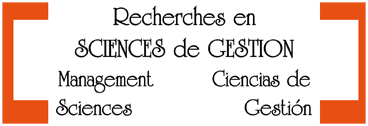
ISSN 2271 - 2836
Institut de Socio-Économie des Entreprises et des Organisations
The Journal RECHERCHES EN SCIENCES DE GESTION-MANAGEMENT SCIENCES-CIENCIAS DE GESTIÓN is aimed at teachers, researchers, trainers, company managers and executives, public and private research organizations, consultancies, certain professions and trade unions and professional organizations.
Through a transdisciplinary approach, the journal strives to strengthen the links between management science and fundamental disciplines such as economics, sociology, psychology, political science, mathematics, econometrics and economic anthropology.
It also aims to develop the search for elements of a generalized management science, detached from national contingencies and more sensitive to current social realities, through in-depth and critical analysis, axiomatization and explanation of the normative assumptions underlying management practices and models.
RECHERCHES EN SCIENCES DE GESTION-MANAGEMENT SCIENCES-CIENCIAS DE GESTIÓN's key features of transdisciplinarity and fundamental methodology will provide all those who are interested in Management Sciences, whether in business or any other organization, with answers to the questions posed by a rapidly expanding discipline.
The journal RECHERCHES EN SCIENCES DE GESTION-MANAGEMENT SCIENCES-CIENCIAS DE GESTIÓN is a methodological and critical journal with a scientific reputation that is widely distributed abroad. Its primary objectives are impeccable quality, originality and scientific rigor.
A rigorous selection policy has led us to propose a typology of articles designed to facilitate the review's content mix, and a critical reading system that shuttles between the author and the journal's editors, thanks to the active support of the Scientific Committee, made up of around a hundred French-speaking professors and researchers, and supplemented since 2004 by two English- and Spanish-speaking scientific committees.
The author or one of the co-authors* has to be a holder of a doctorate
It has become clear that only a collective procedure for independent advice and consultation, with the possibility of shuttling between the management, the Committee and the authors, can avoid two pitfalls:
- sacrificing the quality of the magazine for the sake of friendly concessions ;
- the pure and simple sanction of rejecting an article, with no chance for the author to benefit from the comments and suggestions made, and the possibility of proposing a new draft (either for the issue in question, or for the following one, depending on the extent of the recommended changes).
Articles are submitted to the Scientific Committee without the author's name (although in some cases it can easily be guessed), the aim being to avoid withholding critical observations when certain well-known authors are involved.
Each article is submitted to three reviewers, members of the Scientific Committee, who provide a reasoned opinion to the Journal's management within three months.
These opinions include in-depth criticism and constructive suggestions.
Opinions are communicated to authors, without the names of the reviewers, so that they can, if necessary, rectify their article with a view to publication in the journal RECHERCHES EN SCIENCES DE GESTION-MANAGEMENT SCIENCES-CIENCIAS DE GESTIÓN or in another journal (except in desperate cases...).
Out of consideration for the work put in by both the author and the reviewers, it was felt healthier to see this arrangement not only as an effective screening (a quality objective of the journal RECHERCHES EN SCIENCES DE GESTION-MANAGEMENT SCIENCES-CIENCIAS DE GESTIÓN), but also as a means of gradually helping authors to improve their editorial performance, whatever the target vector chosen for disseminating their messages.
Each article is sent to the reviewers, together with:
- the reviewers 's opinion, to be completed by the reviewers (front and back) and returned to the Journal Director.
Referees are required to report all articles having a similarity with the article submitted to the journal.
Reviewers agree not to retain or copy a manuscript received for review.
We distinguish 3 categories of articles:
- Original contributions based on experimental research and/or conceptual creations (article of 48,000 signs including spaces (bibliography included, excluding cover page and abstracts)).
Assessment criteria: personal contribution of the author (and his/her team, if applicable), logical validation, empirical verification, rigor and explanation of methodology, scientific interest, practical applications.
- Original bibliographical research summary (20 pages in WORD format, double-spaced - 48,000 characters)
Assessment criteria: conciseness, precision, completeness, absence of recent bibliographical synthesis (2 to 3 years) on the subject, originality of presentation.
- Original critical and methodological note (maximum 10 pages in WORD format, double-spaced)
Assessment criteria: validity, scientific interest, rigor, originality of subject and presentation
In order to emphasize the scientific nature of the magazine and avoid the risk of "academicism", it has been suggested to give priority to the first category of articles (original contributions of experimental research and conceptual creation) and to encourage a majority of articles by authors working in teams, without excluding individual research.
- Article must be in WORD format, single-spaced and should not exceed the page limits indicated above.
- Statistical tables, if numerous, should be presented in an appendix.
- The author, to whom a proof is submitted for correction, undertakes to read and correct it within a maximum of 10 days, and to return it to ISEOR. At the publisher's request, authors are urged to avoid making corrections (other than typographical ones).
- An electronic copy of the journal is sent to the author on publication.